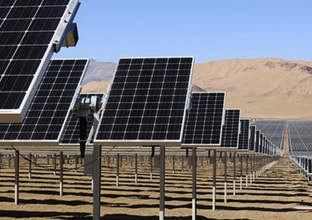Energy shortages are hampering Africa’s manufacturing sector, which is large without adequate electricity. With low production capacity, Africa relies heavily on imports for development. Most of the imported products come from East and South Asia because of the price advantage.
The solar industry in Africa is growing rapidly as the installation of solar equipment continues to increase. As one of the world’s largest solar markets, this makes the situation particularly grim in Africa. It comes as Africa struggles to cope with huge economic losses caused by its dependence on imports.
Until Africa’s electricity supply is substantially improved, it will remain dependent on imports to maximize solar energy potential and expand its use. Currently, African countries are calling for a simplified solar energy import process to make trade easier. However, the current framework is different in Kenya, Nigeria, Cote d ‘Ivories, and South Africa.

According to the report:
The solar energy market in Kenya
In 2014, the Kenyan government abolished VAT on all solar imports, which will no doubt stimulate the import market. This is one of the main drivers of Kenya’s leadership in solar energy use. Kenya’s solar imports are also duty-free. Although this contradicts economic policy (which affects the domestic solar manufacturing industry), Kenya’s zero import duty and zero value-added tax on solar products make solar equipment affordable for many people. Policymakers believe the increased use of solar power has eased the power capacity gap, allowing more power to be supplied to manufacturing.
More electricity means less self-generated electricity, which in turn lowers the overall cost of manufacturing products (solar and non-solar), thus fuelling the green economic growth cycle. In early 2011, Kenya cut import tariffs on raw materials used to make solar equipment. The move is aimed at improving the competitiveness of domestic products. The tariff reduction is a shift from the current 25 percent tariff on such products.
In order to implement appropriate solar value chain standards, the Kenya Energy Regulatory Council has established the qualifications and standards for manufacturers, distributors, and contractors, which will help reduce the negative impact of substandard products and services and provide an enabling environment for the development of quality imported products.

Nigeria’s Solar Market
Nigeria, also one of Africa’s biggest solar markets, has a smaller structure and less regulation. Nigeria’s use and deployment of solar equipment are not at the same level as Kenya’s, and the value chain qualification and training framework is still being fine-tuned. Nigeria and several development agencies are making most of the solar market, especially GesellschaftfurInternationaleZusammenarbeit support framework, certification, and acquiring skills, which will help improve the import market.
Adverse market conditions will lead to the emergence of substandard solar products (inverters, batteries, solar PV, etc.). Differences in regulation and policy have limited the growth of private companies in solar and the broader market. In response, the private and public sectors formed the Nigerian Renewable Energy Association (REAN) in 2016 to promote and multilaterally collaborate on solar energy in Nigeria. Solar products imported into Nigeria are not subject to zero import duty. While the restrictions on imports may not be obvious, the policy raises market prices and discourages the use of solar energy by consumers, especially low-income people.
The Nigerian Standards Organization (SON) is responsible for the import of the product. Some solar practitioners argue that the standards body is not sufficiently equipped to regulate import standards for the emerging solar equipment market. In terms of manufacturing standards, foreign manufacturers can verify with an agent of the Nigerian Standards Organization before import.

As regulators and private companies work together to optimize solar power generation capacity to provide more electricity to countries such as Nigeria and Kenya, this is expected to further optimize the market, especially for improved and low-risk product imports, which seems to be the best option for regions lacking key technologies and manufacturing capacity.
According to the Sino-African Trade Research Center, Africa’s manufacturing sector faces difficulties due to inadequate power supply and inadequate policies. Countries represented by Nigeria and Kenya have optimized the market of solar power generation by optimizing import and export procedures and reducing tariffs. The standardization of the market also further provides a favorable environment for imported products.






